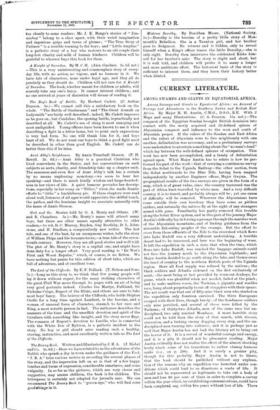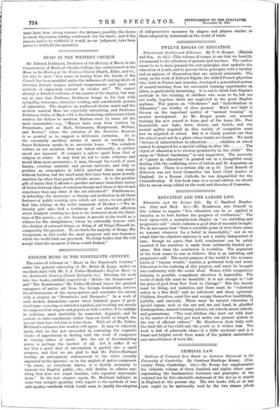C URRENT LITERAT URE.
AMONG SWAMPS AND GIANTS IN EQUATORIAL AFRICA.
Among Swamps and Giants in Equatorial Africa : an Acconnt of Surreys and Adventures in the Southern Sudan and British East Africa. By Major H. H. Austin, C.M.G., D.S.O., R.E. With 2 Maps and many Illustrations. (C. A. Pearson. 15s. net.)—The conquest of the Egyptian Soudan brought British dominion into contact with the newly acquired and ill-defined sphere of Abyssinian conquest and influence to the west and south of Abyssinia proper. If the rulers of the Soudan and East Africa and the rulers of Abyssinia were to live neighbourly with one another, delimitation was necessary, and as a preliminary surveys were undertaken to ascertain something about the" no-man's-land" which lay between the well-defined spheres of occupation. This work has now been accomplished, and a treaty-of delimitation agreed upon. What Major Austin has to relate is how he per- formed his part of the work—that of carrying a continuous survey from the Sobat to the Uganda Railway—the other section, from the Sobat northwards to the Blue Nile, having been mapped independently by another Engineer officer, Major Gwynn. The geographical results of the two surveys are given in the form of a map, which is of great value, since the country traversed was the part of Africa least travelled by white men. And a very difficult country it is to travel, and probably always will be ; yet one cause of difficulty will be removed. Wherever the Abyssinians have come outside their own territory they have come as. pitiless raiders, and naturally the natives fly at the sight of any strangers armed with guns. Familiarity has partly removed this trouble along the Sobat River system, and in this part of the journey Major Austin's difficulty lay in forcing a passage through the marshes west of the Abyssinian mountains, and of finding guidance from the miserable fish-eating peoples of the swamps. BUt the effort to cross from these affluents of the Nile to the rivershed which flows into Lake Rudolf was a very different undertaking. A -terrible desert had to be traversed, and here was the beginning of woes. It left the expedition in such a state that when the Omo, which flows into Lake Rudolf, was reached the baggage animals could not face the journey north to the Abyssinian highlands ; and Major Austin decided to go south along the lake, and thence cross the tract of country to the northern British posts of the Uganda region. Here all food supply was refused by the natives ; the black soldiers and Jehadia sickened on the diet exclusively of meat, —the meat being at last provided by worn-out donkeys, for game, which was plentiful when not needed, failed at the pinch ; and to make matters worse, the Turkana, a gigantic and warlike race, hung about perpetually to cut off stragglers with their spears. The net result was that out of fifty-nine black men who started on the expedition only fourteen survived. The three Europeans escaped with their lives, though barely ; of the Sondanese soldiers only nine perished, and several of these were killed by the Turkana ; of thirty-two Jehadia, men of the same race but un- disciplined, two only reached Mombasa. A more horrible story could not be told than the story of that march, with disease, starvation, and a lurking enemy dogging every step, and the un- disciplined men turning into vultures ; and it is perhaps just as well that Major Austin has not had the literary art to bring out the horror of it. It is a record of wonderful courage and energy, and it is a pity it should not be pleasanter reading. Major Austin evidently does not realise the effect'of the almost shocking levity which some of his transitions to rather clumsy humour make (e.g , on p. 298). And it is surely a greater pity, though for this probably Major Austin is not to blame, that the book should be published without any explana. tion of the reasons why an expedition was launched under con- ditions which could lead to so disastrous a waste of life. It should not be represented as legitimate to take out a body of men and lose 80 per cent. of them in order to ccimplete a survey within the year which, by establishing communications, could have been completed, say, within five years without loss of life. There
must have been strong reasons—for instance, possibly, the desire to check Abyssinian raiding southward—for the haste; and if the reasons had to be withheld, it would, in our judgment, have been better to withhold the narrative.























































 Previous page
Previous page